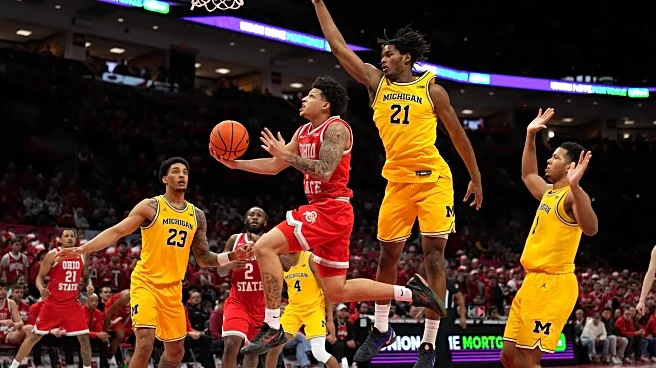What's Happening?
The North Carolina Tar Heels secured a decisive 97-53 victory over the North Carolina Central Eagles, showcasing a strong team identity centered around unselfish play and effective ball movement. Under
the guidance of Hubert Davis, the Tar Heels demonstrated their commitment to 'good to great' basketball, assisting on their first 12 made baskets. Key players like Caleb Wilson and Henri Veesaar contributed significantly, with Wilson scoring 21 points and grabbing 13 rebounds. The team's strategy involved fluid transitions and effective spacing, resulting in 21 assists and numerous clean shots. The Tar Heels' ability to maintain a rhythm in their play was evident as they closed the game on a 68-22 run.
Why It's Important?
This victory highlights the Tar Heels' potential to be a formidable force in college basketball this season. Their emphasis on teamwork and ball movement not only led to a significant win but also set a standard for future games. The unselfish play style could serve as a model for other teams aiming to improve their offensive efficiency. For the Tar Heels, this approach may lead to more consistent performances and success in upcoming matches. The game also underscores the importance of strategic coaching and player buy-in, which can significantly impact a team's performance and morale.
What's Next?
The Tar Heels will likely continue to refine their ball movement strategy as they progress through the season. Coach Davis's focus on making simple plays and avoiding forced errors will be crucial in maintaining their current form. As the team builds more chemistry, they are expected to become even more efficient in their offensive execution. Upcoming games will test their ability to sustain this level of play against potentially tougher opponents, and their performance could influence their standing in the college basketball rankings.
Beyond the Headlines
The Tar Heels' approach to basketball emphasizes the cultural shift towards team-oriented play in sports, where individual statistics are secondary to collective success. This philosophy not only enhances team dynamics but also prepares players for professional environments where collaboration is key. The emphasis on unselfishness and strategic play could inspire similar changes in other sports teams, promoting a broader cultural shift in how success is measured in athletics.










